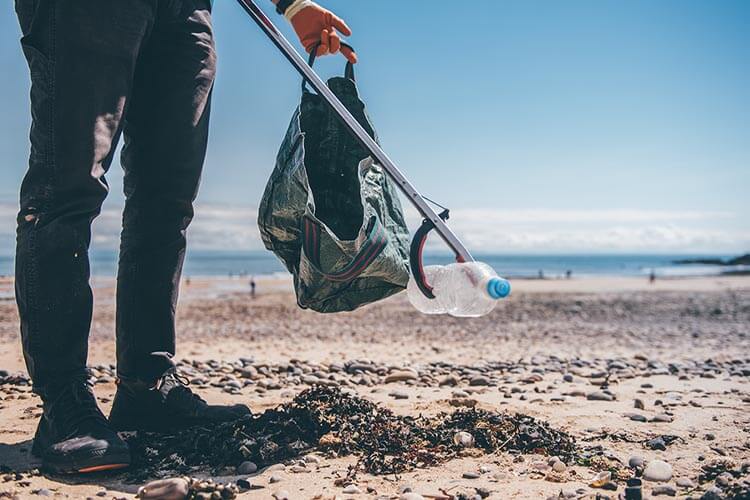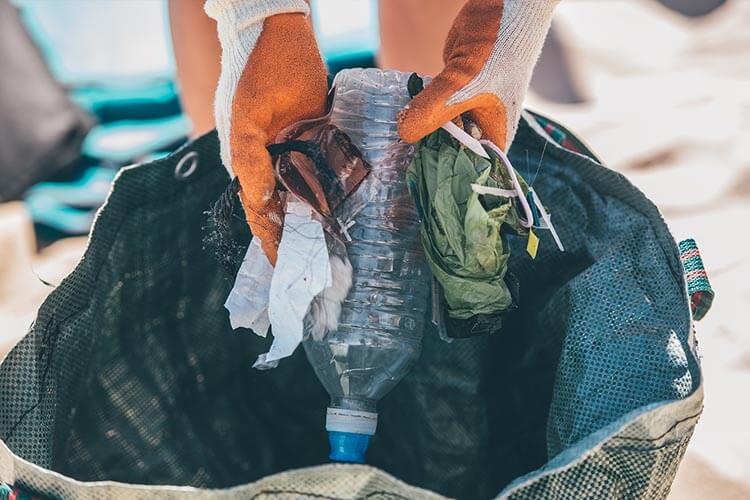
By DIVE Staff
The Marine Conservation Society has published its annual State of our Beaches 2023 report, highlighting the need for fewer single-use plastic items and more refillable options.
The charity’s beach cleaning programme, now in its 30th year, asks volunteers to record all the litter they find within a 100-metre stretch of beach. Gathering the data across the UK and the Channel Islands helps the charity to campaign for policy and industrial change in the drive towards cleaner seas.
In 2023, more than 148 kilometres of beach were surveyed by volunteers, who removed 17,208kgs of litter from the UK’s coast. Using the data collected from more than 14,000 volunteers, the MCS State of our Beaches 2023 report details how half of all litter collected came from public sources that had been dumped, blown or washed onto the UK’s beaches.

Drinks-related litter, such as plastic bottles, caps and cans were among the most reported items, with an average of 16 found per 100 metres of beach surveyed, an increase of 14 per cent over to the charity’s 2022 report. Plastic bottles were found in 73 per cent of all beach surveys – a 4 per cent increase on 2022 – and the MCS inland litter pick survey, Source to Sea, also reported finding plastic bottles on 92 per cent of its cleanups.
The newly published report does, however, include some positive news, with indications that findings of single-use disposable plastic cutlery, trays and straws were reduced by five per cent, and plastic cotton buds by 14 per cent – an indication that bans on the use of such items could be having an effect.
‘Half of the litter found on our beaches originates from public sources, underscoring the pressing issue of single-use plastic,’ said Lizzie Price, MCS Beachwatch Manager. ‘Evidence shows that refillable alternatives and litter return schemes effectively reduce rubbish, as demonstrated by the decline our data has shown in items like plastic bags and disposable cutlery.

‘Urgent and decisive action from UK governments is needed to accelerate our shift towards a circular economy, where we reuse, repair and recycle,’ added Price; ‘the public needs greater access to refillable products and systems need to be implemented in which manufacturers are responsible for their waste.’
The devolved UK governments have each committed to implementing bottle deposit return schemes (DRS), in which a 20 pence deposit would be levied against drinks containers, which would be returned to the customer when recycled. Scotland was scheduled to implement a DRS in 2023, but deferred it until 2025 following a dispute with the British government over its refusal to accept glass bottles in England’s DRS – despite the MCS report showing that glass bottles were found on 52 per cent of beaches in 2023.
In light of the DRS delay and wrangling over which materials should be included, MCS says the charity is calling on the UK’s governments to introduce ‘all-inclusive’ deposit return schemes as soon as possible, in which aluminium cans, and plastic and glass bottles can be recycled as an aid to reducing drinks-container- related pollution.
To find out more about the Marine Conservation Society’s beach cleans and how to get involved, head to mcsuk.org/beach-cleans


